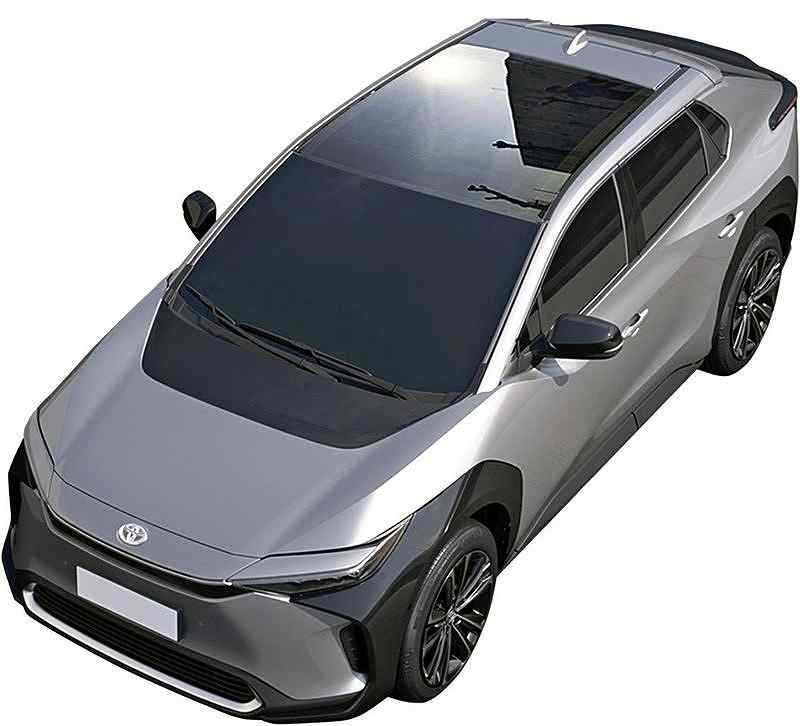
Toyota’s bZ4X electric vehicle, coming out next year, can be fitted with solar panels on the roof.
November 3, 2021
Toyota Motor Corp., known for its strength in hybrid vehicles, is preparing to roll out its first fully electric global model, the bZ4X, as part of moves toward a decarbonized society.
The bZ4X, to be launched in mid-2022, will be the company’s first global strategic vehicle, beginning Toyota’s full-scale development of electric vehicles. The company aims to achieve performance comparable to that of other leading companies.
The bZ4X is a midsize sport utility vehicle and the first in a new electric vehicle series, bZ. It also is the first vehicle to feature a chassis designed specifically for such cars.
The bZ4X has achieved a high standard for a commercial electric vehicle, with a maximum range of about 500 kilometers per charge as a front-wheel drive vehicle in the Worldwide Harmonized Light Vehicles Test Cycle (WLTC) mode. Heating efficiency has been improved to help keep driving range from dropping even in winter, which is not an ideal season for such cars.
Daisuke Ido, the chief engineer in charge of the vehicle’s development, said, “We focused on energy-saving performance to achieve sufficient driving range without unnecessarily increasing battery volume,” indicating the importance of balancing price and practicality.
The durability of the battery will also be improved. Toyota said the company is likely to be able to achieve technology that will see the fully charged capacity of the car’s lithium-ion batteries decline by only 10% after 10 years of repeated use. The technology is expected to increase the value of used electric vehicles to boost their popularity.
Toyota has adopted a “full lineup strategy” to offer a wide range of electrified vehicles, including not only electric vehicles but also hybrid and plug-in hybrid vehicles, to meet the needs of each country and distinguish itself from European automakers and Honda Motor Co., which are rushing to switch entirely to electrification.
The strategy is based on the view that it is difficult for electric vehicles to spread rapidly in regions such as emerging countries where electricity and recharging infrastructure are not yet in place. Toyota believes that replacing purely gasoline-powered cars with hybrids is a more effective way of reducing greenhouse gas emissions there, because hybrids are no different from conventional gasoline vehicles in terms of usability.
In Europe, however, there are moves to regulate sales of hybrid vehicles in the future, so efforts to develop electric vehicles are unavoidable. Toyota plans to launch a total of 15 such models, including seven models of the bZ series, by 2025 to accelerate its sales.
Nissan Motor Co. will release its electric Ariya SUV, which is positioned as the company’s global strategic vehicle, this winter. Honda plans to make all of its new vehicles electric vehicles or hydrogen-powered fuel cell vehicles in 2040.
Top Articles in Business
-

Prudential Life Insurance Plans to Fully Compensate for Damages Caused by Fraudulent Actions Without Waiting for Third-Party Committee Review
-

Narita Airport, Startup in Japan Demonstrate Machine to Compress Clothes for Tourists to Prevent People from Abandoning Suitcases
-

Japan, U.S. Name 3 Inaugural Investment Projects; Reached Agreement After Considerable Difficulty
-

Toyota Motor Group Firm to Sell Clean Energy Greenhouses for Strawberries
-

SoftBank Launches AI Service for Call Centers That Converts Harsh Customer Voices into Softer Voices
JN ACCESS RANKING
-

Japan PM Takaichi’s Cabinet Resigns en Masse
-

Japan Institute to Use Domestic Commercial Optical Lattice Clock to Set Japan Standard Time
-

Israeli Ambassador to Japan Speaks about Japan’s Role in the Reconstruction of Gaza
-

Man Infected with Measles Reportedly Dined at Restaurant in Tokyo Station
-

Videos Plagiarized, Reposted with False Subtitles Claiming ‘Ryukyu Belongs to China’; Anti-China False Information Also Posted in Japan





















